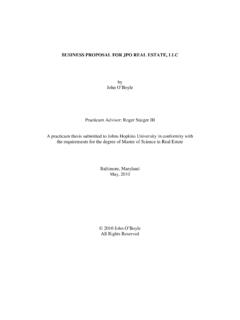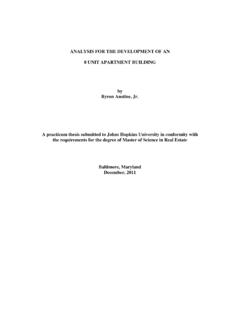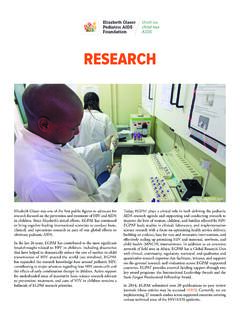Transcription of THE ROLE OF SCIENCE ADVISORY BOARDS IN by Lisa K. …
1 THE ROLE OF SCIENCE ADVISORY BOARDS IN FEDERAL HEALTH POLICY by Lisa K. Fleisher, MPH A dissertation submitted to Johns Hopkins University in conformity with the requirements for the degree of Doctor of Philosophy Baltimore, Maryland March, 2015 2015 Lisa K. Fleisher All Rights Reserved ii ABSTRACT In the context of scarce financial resources for government programs in both the United States and internationally, efforts to develop health policies that are informed by evidence may increase in the coming years. In the United States, policymakers repeatedly attempt to integrate research and evidence into the policy process by establishing federal ADVISORY committees (FACs) under the purview of the Federal ADVISORY Committee Act (FACA) of 1972.
2 Although FACA committees have existed for 40 years, are used frequently by the executive branch, and have accounted for $ billion in government spending between 2002 and 2011, they remain little-known [and] little-studied (McApline and LeDonne, 1993). Two case studies were conducted for this dissertation using a multiple-case study design and a grounded theory approach to data analysis. The overall aim was to describe how FACs play a role in the policy process. The two cases were the SCIENCE ADVISORY board to the President s Emergency Plan for AIDS Relief and the National Climate Assessment and Development ADVISORY Committee, established by the US Department of State and the Department of Commerce, respectively.
3 Semi-structured interviews were conducted with purposively-selected FAC members and staff from government agencies and non-governmental organizations (NGOs). Interview transcripts were coded using Atlas/ti following the grounded theory method outlined by Charmaz. Documents from FAC proceedings were also analyzed. Data collection was concluded when theoretical saturation was achieved. Findings suggest that FACA committees are heterogeneous in their primary objectives, operating structures, decision-making processes, and methods of engaging with NGOs. In addition, ambiguity in the FACA language and the politically sensitive nature of selecting members complicates efforts to establish a FAC. However, in spite of the differences across FACA iii committees and the difficulties encountered by government agencies when establishing them, findings indicate that FACs can be effective as mechanisms for agencies to obtain specific and broad guidance from independent experts on scientific matters of concern to the agency.
4 The extent to which recommendations from FACs are adopted by the establishing agency is influenced by the perspectives of the executive and legislative branches on the value of evidence-based policy, as well as the perspective of the agency administrator. Advisor: Stephen Teret, JD Readers: Stefan Baral, MD Sara Bennett, PhD Shannon Frattaroli, PhD Alternates: Joanna Cohen, PhD Daniel Webster, PhD iv ACKNOWLEDGEMENTS "No one who achieves success does so without the help of others. The wise and confident acknowledge this help with gratitude." Alfred North Whitehead While the completion of this dissertation (nor anything that came before it) certainly does not make me wise, I am confident that without the help of so many others, I would not have finished my PhD.
5 In particular, I am confident that I would not have been able to complete this degree without the patience, understanding, and kindness of my advisor, Steve Teret. Over the past six years and even dating back to 2004, when I started my MPH Steve has been a wonderful mentor who consistently provided sage advice that truly was offered with my best interests in mind. In spite of his busy schedule, Steve always told me that I could have as much time as I need . I am particularly grateful for Steve s patience as I proceeded slowly (and at times, not so surely) through the process of obtaining my PhD. I feel so fortunate to have had an advisor who was dedicated to helping me grow as a researcher and policy analyst but who also was concerned about my well-being.
6 Steve, along with his wife Lynn, looked after me as they would their own daughter. In addition to ensuring that I got time on Steve s calendar whenever I needed it, Sharon Wakefield has done the same, for which I am grateful. It may be the exception rather than the rule that a doctoral student benefits from having the same faculty on her final defense committee as she did on her preliminary oral exam committee. Over the past four years, Shannon Frattaroli and Sara Bennett have consistently provided helpful and thought-provoking feedback on my research. Stef Baral became involved in the summer of 2014 but provided detailed comments and suggestions on every chapter, often while on a plane or overseas. I also thank Tom Burke and Chris Beyrer for focusing my research in the early phases and v for providing a very experienced real-world perspective on the role of SCIENCE and SCIENCE advisors in the policy process.
7 Early into the PhD, I discovered that coming back to school after eight years in the working world was not as easy of a transition as I thought it would be. I am grateful to Karen Bandeen-Roche and Marie Diener-West for their patience and understanding during my first year of biostatistics. More recently, the opportunity to work with and learn from David Peters, Daniela Rodriguez, and Antonio Trujillo on research projects has strengthened my skills as a researcher, project manager, and writer. I am especially thankful to Daniela for being a mentor, and for her kindness, advice, encouragement, and wonderful sense of humor. Throughout my time as a PhD student, I have had the opportunity to work as a consultant at the World Bank and the United States Agency for International Development.
8 This work has provided great opportunities for professional growth. I am grateful to Nicole Klingen, Ajay Tandon, Petra Vergeer, Jack Langenbrunner, and Darren Dorkin at the World Bank for bringing me back into the HNP family and pushing me to do good work, and to Joe Naimoli at USAID for his mentorship and friendship. As always, George Schieber has been a wonderful mentor, co-author, and boss, and from the beginning, told me to just finish your PhD . Cristian Baeza has also been a consistent source of encouragement and sage advice. As often happens, life threw a series of curveballs over the past six years when I least expected it. Words simply are not sufficient to express how grateful I am to my family and friends for their love, support, help, and advice.
9 If my parents doubted my ability to finish my PhD, they never let on: their consistent support has been a wonderful source of reassurance. My brother remains one of the strongest and funniest people I know, and has shown me how to be courageous even when the going gets tough. My grandparents, Etta and Milton Fleisher, had the generosity and vi foresight to permit their grandchildren to have the best education possible. Scott Benner has helped to ensure their wishes were protected and has been an invaluable advisor in all things. The countless laughs and meals I ve had with the East Coast Fleishers (Brian Hamman included) as well as with Ashley, Brian, Camden, and Braden Murray have provided a wonderful distraction when study breaks were much needed.
10 Thank you to Lynne Gots, Camille Moses-Allen, Esther Collinetti, Jen Gasparine, and Kristy Prasnitz for teaching me about mindfulness and self-worth, to trust my instincts, and providing an outlet to keep both body and mind in good health. To my friends Lainie and Adam, for going above and beyond, and baby Alex for providing a sweet and cuddly distraction; Sufia and Dave; Sharon, Michael, Elijah, Jacob, and Tirzah Purdy; Sarah, Graham, Houlton, and Chester Pingree; Tracy; Eva and Helen; Christine; Beth and Eric; Dana; Amelia; Julia; and Dave thank you for being my lifeline, especially over the past year. And to my canine companion Sabi, you came along at just the right time with your unconditional love. Finally, I am grateful to all of my interview respondents for taking the time out of their insanely busy schedules to speak with me often in a very candid manner about their experiences with federal ADVISORY committees.















